187 Reasons Mexicanos Can’t Cross The Border (Remix)
--Abutebaris modo subjunctivo denuo
Because Lou Dobbs has been misusing the subjunctive again
Because our suitcases are made with biodegradable maguey fibers
Because we still resemble La Malinche
Because multiplication is our favorite sport
Because we’ll dig a tunnel to Seattle
Because Mexico needs us to keep the peso from sinking
Because the Berlin Wall is on the way through Veracruz
Because we just learned we are Huichol
Because someone made our ID’s out of corn
Because our border thirst is insatiable
Because we’re on peyote & Coca-Cola & Banamex
Because it’s Indian land stolen from our mothers
Because we’re too emotional when it comes to our mothers
Because we’ve been doing it for over five hundred years already
Because it’s too easy to say “I am from here”
Because Latin American petrochemical juice flows first
Because what would we do in El Norte
Because Nahuatl, Mayan & Chicano will spread to Canada
Because Zedillo & Salinas & Fox are still on vacation
Because the World Bank needs our abuelita’s account
Because the CIA trains better with brown targets
Because our accent is unable to hide U.S. colonialism
Because what will the Hispanik MBAs do
Because our voice resembles La Llorona’s
Because we are still voting
Because the North is really South
Because we can read about it in an ethnic prison
Because Frida beat us to it
Because US & European Corporations would rather visit us first
Because environmental US industrial pollution suits our color
Because of a new form of Overnight Mayan Anarchy
Because there are enough farmworkers in California already
Because we’re meant to usher a post-modern gloom into Mexico
Because Nabisco, Exxon, & Union Carbide gave us Mal de Ojo
Because every nacho chip can morph into a Mexican Wrestler
Because it’s better to be rootless, unconscious, & rapeable
Because we’re destined to have the “Go Back to Mexico” Blues
Because of Pancho Villa’s hidden treasure in Chihuahua
Because of Bogart’s hidden treasure in the Sierra Madre
Because we need more murals honoring our Indian Past
Because we are really dark French Creoles in a Cantínflas costume
Because of this Aztec reflex to sacrifice ourselves
Because we couldn’t clean up hurricane Katrina
Because of this Spanish penchant to be polite and aggressive
Because we had a vision of Sor Juana in drag
Because we smell of Tamales soaked in Tequila
Because we got hooked listening to Indian Jazz in Chiapas
Because we’re still waiting to be cosmic
Because our passport says we’re out of date
Because our organ donor got lost in a Bingo game
Because we got to learn English first & get in line & pay a little fee
Because we’re understanding & appreciative of our Capitalist neighbors
Because our 500 year penance was not severe enough
Because we’re still running from La Migra
Because we’re still kissing the Pope’s hand
Because we’re still practicing to be Franciscan priests
Because they told us to sit & meditate & chant Nosotros Los Pobres
Because of the word “Revolución” & the words “Viva Zapata”
Because we rely more on brujas than lawyers
Because we never finished our Ph.D. in Total United Service
Because our identity got mixed up with passion
Because we have visions instead of televisions
Because our huaraches are made with Goodyear & Uniroyal
Because the pesticides on our skin are still glowing
Because it’s too easy to say “American Citizen” in cholo
Because you can’t shrink-wrap enchiladas
Because a Spy in Spanish sounds too much like “Es Pie” in English
Because our comadres are an International Political Party
Because we believe in The Big Chingazo Theory of the Universe
Because we’re still holding our breath in the Presidential Palace in Mexico City
Because every Mexican is a Living Theatre of Rebellion
Because Hollywood needs its subject matter in proper folkloric costume
Because the Grammys, Emmies, MTV & I-Tunes are finally out in Spanish
Because the Right is writing an epic poem of apology for our proper edification
Because the Alamo really is pronounced “Alamadre”
Because the Mayan concept of zero means “U.S. Out of Mexico”
Because the oldest Ceiba in Yucatán is prophetic
Because England is making plans
Because we can have Nicaragua, Honduras, & Panama anyway
Because 125 million Mexicans can be wrong
Because we’ll smuggle an earthquake into New York
Because we’ll organize like the Vietnamese in San José
Because we’ll organize like the Mixtecos in Fresno
Because East L.A. is sinking
Because the Christian Coalition doesn’t cater at César Chávez Parque
Because you can’t make mace out of beans
Because the computers can’t pronounce our names
Because the National Border Police are addicted to us
Because Africa will follow
Because we’re still dressed in black rebozos
Because we might sing a corrido at any moment
Because our land grants are still up for grabs
Because our tattoos are indecipherable
Because people are hanging milagros on the 2000 miles of border wire
Because we’re locked into Magical Realism
Because Mexican dependence is a form of higher learning
Because making chilaquiles leads to plastic explosives
Because a simple Spanish Fly can mutate into a raging Bird Flu
Because we eat too many carbohydrates
Because we gave enough blood at the Smithfield, Inc., slaughterhouse in Tar Heel, NC
Because a quinceañera will ruin the concept of American virginity
Because huevos rancheros are now being served at Taco Bell as Wavoritos
Because every Mexican grito undermines English intonation
Because the President has a Mexican maid
Because the Vice President has a Mexican maid
Because it’s Rosa López’s fault O.J. Simpson was guilty
Because Banda music will take over the White House
Because Aztec sexual aberrations are still in practice
Because our starvation & squalor isn’t as glamorous as Somalia’s
Because agribusiness will whack us anyway
Because the information superhighway is not for Chevy’s & Impalas
Because white men are paranoid of Frida’s mustache
Because the term “mariachi” comes from the word “cucarachi”
Because picking grapes is not a British tradition
Because they are still showing Zoot Suit in prisons
Because Richie Valens is alive in West Liberty, Iowa
Because ?[is this supposed to be a ?, or are we waiting for a name? I think I know, but thought I ought to ask, in case…] & the Mysterians cried 97 tears not 96
Because Hoosgow, Riata, Rodeo are Juzgado, Riata and Rodeo
Because Jackson Hole, Wyoming will blow as soon as we hit Oceanside
Because U.S. narco-business needs us in Nogales
Because the term “Mexican” comes from “Mexicanto”
Because Mexican queers [do you want to use this word? How about queers, a little more politically correct, though still problematic.] crossed already
Because Mexican lesbians wear Ben Davis pants & sombreros de palma to work
Because VFW halls aren’t built to serve cabeza con tripas
Because the National Guard are going international
Because we still bury our feria in the backyard
Because we don’t have international broncas for profit
Because we are in love with our sister Rigoberta Menchú
Because California is on the verge of becoming California
Because the PRI is a family affair
Because we may start a television series called No Chingues Conmigo
Because we are too sweet & obedient & confused & (still) [what about the brackets here? Should it be parenthesis?] full of rage
Because the CIA needs us in a Third World State of mind
Because brown is the color of the future
Because we turned Welfare into El Huero Felix
Because we know what the Jews have been through
Because we know what the Blacks have been through
Because the Irish became the San Patricio Corps at the Battle of Churubusco
Because of our taste for Yiddish gospel raps & tardeadas & salsa limericks
Because El Sistema Nos La Pela
Because you can take the boy outta Mexico but not outta the Boycott
Because the Truckers, Arkies and Okies enjoy our telenovelas
Because we’d rather shop at the flea market than Macy’s
Because pan dulce feels sexual, especially conchas & the elotes
Because we’ll Xerox tamales in order to survive
Because we’ll export salsa to Russia & call it “Pikushki”
Because cilantro aromas follow us wherever we go
Because we’ll unionize & sing De Colores
Because A Day Without a Mexican is a day away
Because we’re in touch with our Boriqua camaradas
Because we are the continental majority
Because we’ll build a sweat lodge in front of Bank of America
Because we should wait for further instructions from Televisa
Because 125 million Mexicanos are potential Chicanos
Because we’ll take over the Organic Foods Whole Foods’ business with a molcajete
Because 2000 miles of maquiladoras want to promote us
Because the next Olympics will commemorate the Mexico City massacre of 1968
Because there is an Aztec temple beneath our Nopales
Because we know how to pronounce all the Japanese corporations
Because the Comadre network is more accurate than CNN
Because the Death Squads are having a hard time with Caló
Because the mayor of San Diego likes salsa medium-picante
Because the Navy, Army, Marines like us topless in Tijuana
Because when we see red, white & blue we just see red
Because when we see the numbers 187 we still see red
Because we need to pay a little extra fee to the Border
Because Mexican Human Rights sounds too Mexican
Because Chrysler is putting out a lowrider
Because they found a lost Chicano tribe in Utah
Because harina white flour bag suits don’t cut it at graduation
Because we’ll switch from AT&T & MCI to Y-que, y-que
Because our hand signs aren’t registered
Because Freddy Fender wasn’t Baldomar Huerta’s real name
Because “lotto” is another Chicano word for “pronto”
Because we won’t nationalize a State of Immigrant Paranoia
Because the depression of the 30s was our fault
Because “xenophobia” is a politically correct term
Because we shoulda learned from the Chinese Exclusion Act of 1882
Because we shoulda listened to the Federal Immigration Laws of 1917, ’21, ’24 & ‘30
Because we lack a Nordic/ Teutonic approach
Because Executive Order 9066 of 1942 shudda had us too
Because Operation Wetback took care of us in the 50’s
Because Operation Clean Sweep picked up the loose ends in the 70s
Because one more operation will finish us off anyway
Because you can’t deport 12 million migrantes in a Greyhound bus
Because we got this thing about walking out of everything
Because we have a heart that sings rancheras and feet that polka
Gente: go to his website where there's more info and audio clips! And don't forget to BUY THE BOOK!
http://187express.com
 • ISBN: 978-1-60448-027-6 • Paperback • $8.95
• ISBN: 978-1-60448-027-6 • Paperback • $8.95






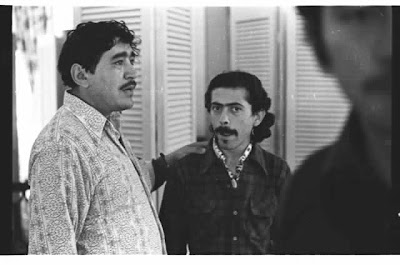

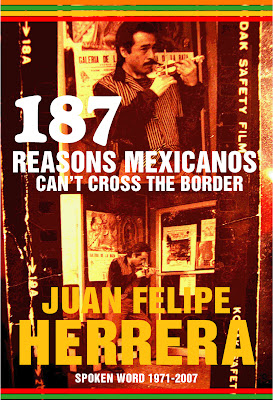




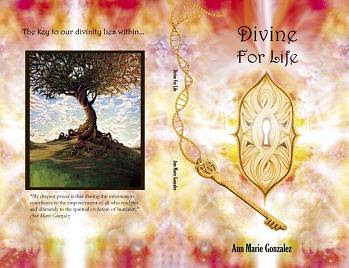


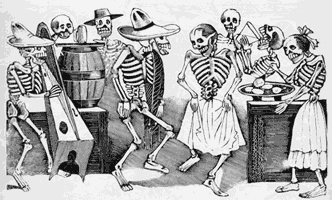
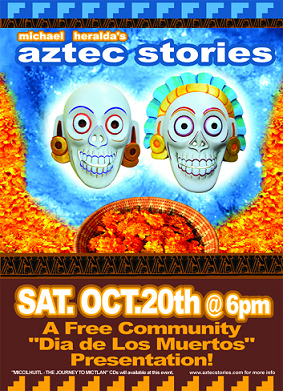
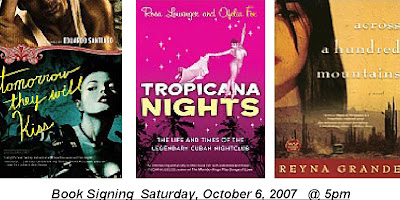
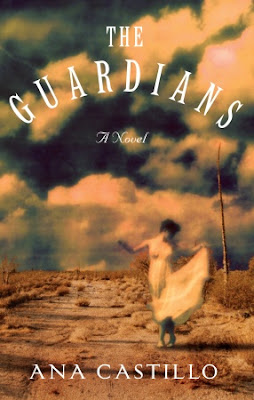





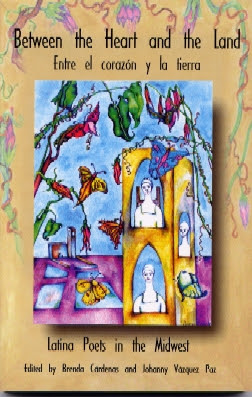
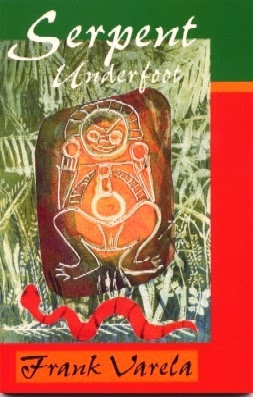
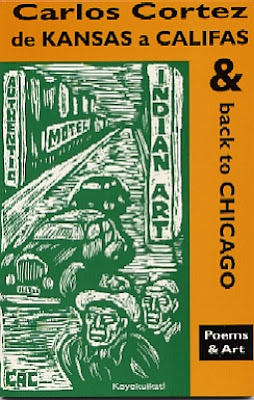
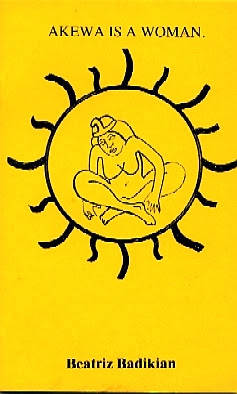

This comment has been removed by the author.
And here is is without the typo: Where I live we have a barrio with pretty gardens and shrines to the Virgen de Guadalupe a few blocks from a house with fake guard tower complete with a rifle-totting mannequin and an YOU CAN TAKE MY GUN WHEN YOU PREY IT FROM MY COLD, DEAD FINGERS sign. The gentry seem to afraid to come here, but the African immigrants like it. ¡Viva Arizona!
My childhood neighborhood was puro fenced-in dirt, except for the Benta's next door. They had the only manicured lawn for blocks around. Of course, our dogs preferred to poop there causing endless friction between them and my grandpa, who lived up front. Our house was in the back of the lot. He sat on his front porch every day in warm weather, smoking a pipe and talking to his parrot, but the problems with the Benta's continued. He ended up creating a barrier of found wood and metal between his yard and theirs so he wouldn't have to see them when they pulled into their driveway. Theirs was the only attempt at gentrification I remember. I hope they remember him and our dogs fondly.
Rudy, this certainly brings back memories of my own dusty, poor neighborhood when I was growing up in South Texas in a little town of 20K people. Few folks had grass in their yards, with no professional landscaping, no hired gardeners, lots of dust swirling on windy days (which was frequent), and a caliche street, with huge chunks of gravel. I was pretty grown by the time our street finally got paved in asphalt. The neighborhood now, more than 40 years later, still looks pretty much the same. Thanks for your good sense of humor!